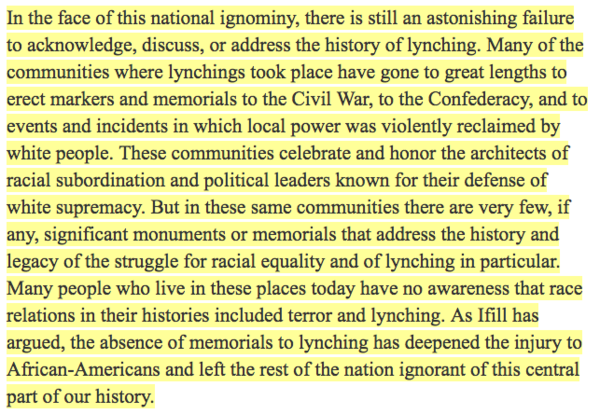Hello there! I hope you’ve had a strong week. Mine was solid, thank you for asking. A highlight was that the Summer Kindle Party was last Saturday, and it was a huge success. (If you’re interested, here’s more about the Kindle Classroom Project.)
Anyway, enough about me. Today’s edition of The Highlighter focuses on race and is organized in two parts. First up is an essay by my hero Bryan Stevenson that offers historical context to our current horror of police killings. The second piece is the digest’s first contribution from a conservative publication, and it makes a key point: that white liberals need to do more than just talk a good game about social justice.
After the photo break, I’ve included two profiles / book reviews. The first piece highlights Roxane Gay and her latest, Hunger, and the second piece highlights Sherman Alexie and his latest, You Don’t Have to Say You Love Me. Please enjoy all four articles and let me know what you think!
A Presumption of Guilt: How Centuries of Racism Have Led to Police Killings
When white police officers kill Black people, they are not acting on their own. Hundreds of years of American racism, from slavery to Jim Crow to lynching to the death penalty, have contributed to the perception that African American people are dangerous and guilty. Police shootings are the new lynchings, according to Bryan Stevenson (#9, #28, #32, #54, #93). In this essay, Mr. Stevenson argues that our country’s inability to acknowledge our history of lynching prevents us from progressing toward any shared goal of justice. Highlighted below is one of my favorite excerpts from the piece. (You see? — I’m highlighting!)
White Liberals Denounce Inequity While Keeping It For Themselves
Loyal subscribers have asked me why I don’t include articles from conservative news sources. It’s not from a lack of trying. Not to be snooty, but the primary reason is that the conservative articles I find are too short, poorly written, and festooned with advertisements. (If you have recommendations, please send them my way.) This piece — about how white liberals claim to advocate for social justice without making any sacrifices themselves — is different. For the most part, author William Voegeli makes solid points: Anyone can denounce inequity, he writes, but it’s much harder actually to renounce it. Checking your privilege doesn’t do anything to make our society more free and fair. (Rebuttal: Neither does denying that inequity exists.)
22 friends and family prepared 400 Kindles last Saturday for middle school students in Oakland. Here is Kindle captain and loyal subscriber Angelina with Kindle #400. Rejoice!
Roxane Gay’s New Memoir, Hunger, Is Her Most Feminist Act Yet
This is a profile of author Roxane Gay (#4, #82) and a review of her new book, Hunger: A Memoir of (My) Body. Ms. Gay writes about her weight, what it feels like to be fat, how our society can’t talk about fatness, and about how being a fat person of color negates gender. In addition to decrying the weight-loss industry, and self-help books, Ms. Gay writes about her shame, and whether there is a bottom of it, and how the shame and weight gain emerged from being raped when she was 12.
For some crazy reason, Sherman Alexie has not yet appeared in The Highlighter, but that silliness ends right here and now. This well-written profile previews Mr. Alexie’s new memoir, You Don’t Have to Say You Love Me, which focuses on the complicated relationship he had with his mother. Mr. Alexie writes, “For all the damage my mother did to me, the thing she gave me, and that has saved me, is the arrogant belief that I deserve to live.” This article also explains why Mr. Alexie did not protest at Standing Rock, why straight white women are his most devoted readers, and how genocide does not have to involve mass death.
Another issue of The Highlighter is officially in the books! Thank you for reading it. Also, please welcome new subscribers John and Julie. The movement is picking up steam. This week, let me know (either by responding to this email or by giving me a thumbs-up or thumbs-down below) what you thought about the big yellow highlighted excerpt above. (It’s a new feature I’m testing out.) Did you like it? hate it? not care either way? Thank you for sharing your thoughts, and I’ll see you next Thursday at 9:10 am for The Highlighter #100!









